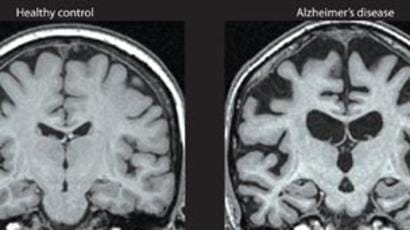Is it possible to prevent Alzheimers? What is the difference in Alzheimers and dementia? Does a brain scan predict who will get dementia? What is brain shrinkage?

Table of Contents
Alzheimers Early Diagnosis
How soon can Alzheimers be diagnosed? Is early detection possible? Can it be prevented?
Cerebral atrophy may be seen in an MRI up to 10 years before Alzheimer’s disease is diagnosed.
Such changes in brain size might predict who could develop demential or other cognitive impairments. Harvard Medical School published their findings in a news release.
How is Dementia Different from Alzheimers?
Alzheimers is a common form of dementia and sometimes referred to as senile dementia
Over 5 million people in the USA have Alzheimers.
Diagnosing Alzheimers consists of a battery tests and interviews to determine cognitive impairment. Doctors may order laboratory tests, brain-imaging tests or memory testing.
Is There a Link Between High Blood Pressure and Alzheimers?
Some studies show that treating high blood pressure might reduce the risk of Alzheimers, or delay the onset.
High blood pressure has been known to cause the formation of neurofibrillary tangles and amyloid plaque in the brain. Both of these are found in patients with senile dementia.
A recent study of 1288 people, age 65 and older (over half were women), indicated a connection to high blood pressure and Alzheimers.
Participants were required to authorize a brain autopsy that looked for aging signs including tangles and plaque.
While the study does not PROVE that high blood pressure causes dementia the parallels are enough to encourage treatment of high blood pressure.
These studies show that elevated blood pressure increase the risk of vascular dementia.
Measuring Cerebral Atrophy
Researchers used magnetic resonance imaging (MRI) brain scans to measure specific areas of the brain that are known to be involved in senile dementia in two groups of people with no memory issues or signs of Alzheimer’s disease. Separate studies indicate about one in four people with shrunken brains develop dementia.
Marc L. Gordon, MD, a neurologist and Alzheimer’s disease researcher at The Feinstein Institute for Medical Research in Manhasset, N.Y., says that those who went on to develop to Alzheimer’s dementia already had thinning of the cerebral cortex in areas of the brain involved in early Alzheimer’s disease at the beginning of the study, compared with those who didn’t develop Alzheimer’s.
“Relatively small, but reproducible differences in cortical atrophy (brain shrinkage) may be identified in asymptomatic individuals nearly a decade before the onset of dementia, and this may be a useful early imaging biomarker for predicting risk of subsequent dementia,” he says in a news release. – WebMD
#Alzheimers #Dementia
Leave a Reply